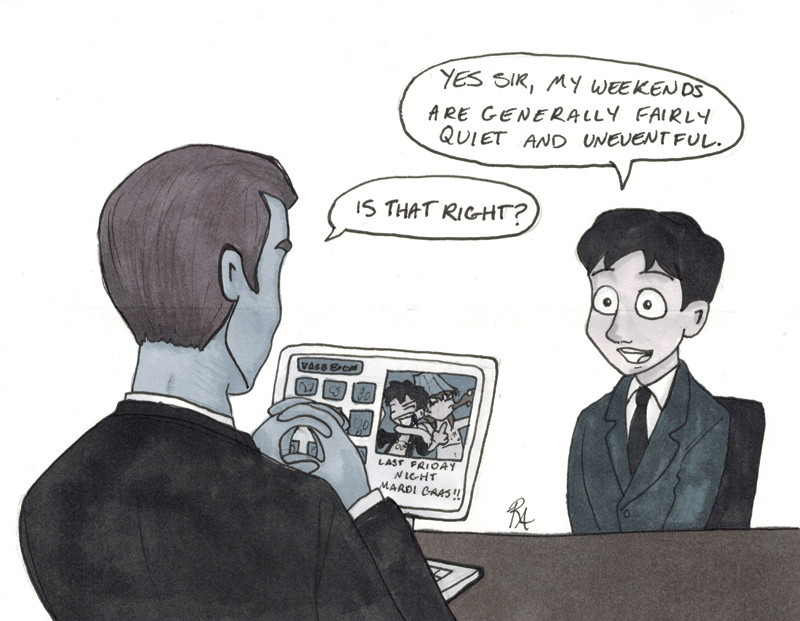Be yourself, but be cautious
In today’s job market, considering how you portray yourself online is important
Spring is fast approaching, and in the student world that means mostly one thing: a mad dash to scoop up the most fun and lucrative summer jobs before everyone else.
And if you happen to be graduating, the stakes are even higher.
So after you’ve blown the dust off that stack of old resumes and made the obligatory humble-boast phone calls to all your dream employers, it might be time to clean up your online image before heading out to shake hands.
In a job market saturated with undergrads, employers are in a position to be as selective as they want.
So, if they type your name into a Google search and come across your moonlighting work as a forum troll, they’re under no obligation to make a last ditch effort to catch your killer resume and cover letter as they fall into the shredder.
Wade Miller, co-founder of Pinnacle Staffing Solutions, says that employers are certainly checking out their candidates.
“People have to remember that anything that is out in public is available for employers to see as well,” Miller says. “That’s something you really have to think about. What is your image in the world?”
Your physical charm won’t necessarily trump a potentially negative web search.
“It’s not less significant, it’s not separate, it is who you are,” says Georgy Cohen, founder and principal of Crosstown Digital Communications, a consulting firm based in Massachusetts.
“So just like you wouldn’t go to a job interview wearing a stained shirt, drunk and disheveled, or not knowing what you’re talking about, you should have your presentation of yourself online straight as well,” Cohen says.
It might seem easier to simply opt out, change your Facebook privacy settings to the maximum and join the Luddites, but you’d have to take the entire Internet down with you.
“You can not be there, depending on your career or what you’re doing, but that said, people are going to be talking about you online anyway,” Cohen says. “People are finding ways to assess you and represent you without you representing yourself.”
Cohen uses the example of an offline lawyer who still gets reviewed by clients online for all to see, but it’s just as easy to imagine your friends tweeting your name without your permission.
It’s important to remember that things on the Internet never go away, Cohen says. Your past indiscretions are like pesky virtual ghosts.
“Be aware of what’s out there because it’s just as much fair game in how we assess people as in-person or any other context,” Cohen says.
The best method may be to create your own online presence and take an active role in determining what people see when they start to dig around.
This could include everything from maintaining an up-to-date LinkedIn profile to purchasing your own domain name and creating links to all relevant information.
“I think the important thing is to use common sense,” Miller says. “And if you were a future employer, what would you not want to see or what would you want to see in a future employee.
“Just be yourself, but at the same time be very cautious.”
From her experience in helping people establish themselves online, Cohen warns against common pitfalls.
“There’s two kinds of terrible,” she says. “Terrible in that it’s neglected or out of date - if you’re going to be out there you don’t want it to look like garbage.”
This includes things like tacky web design and pages with poor grammar and spelling that present obsolete information.
“On the other end there are people that try too hard,” Cohen says. “The more you let your work and who you are speak for itself, in the end that’s going to make you or break you.”
This all sounds like a lot of work because it is.
The truth is that most students who just want to do their four months of data input slave-dronery probably don’t need to care as much as a prospective politician or executive.
“A lot of the time, administrative experience doesn’t involve a lot of Internet presence,” says Mohamed Hassan, branch manager of the Winnipeg-based Staffmax, a staffing and recruiting agency.
“If the person does have the experience in that placement and you do a reference check, there’s not a lot, short of a police record or something like that, that would make me see them in a negative light,” says Hassan, whose branch hires for many temporary positions.
Sales positions, on the other hand, are more visible.
“A lot of companies are image-conscious,” Hassan says. “So, for example, if a certain company is hiring an individual to be sales representative, and their Facebook is contradictory with the image of that company, then it would make sense not to go forward with that candidate.”
Miller suggests that the best approach to online presence management is to think like the people you want to work for.
Published in Volume 66, Number 19 of The Uniter (February 8, 2012)







